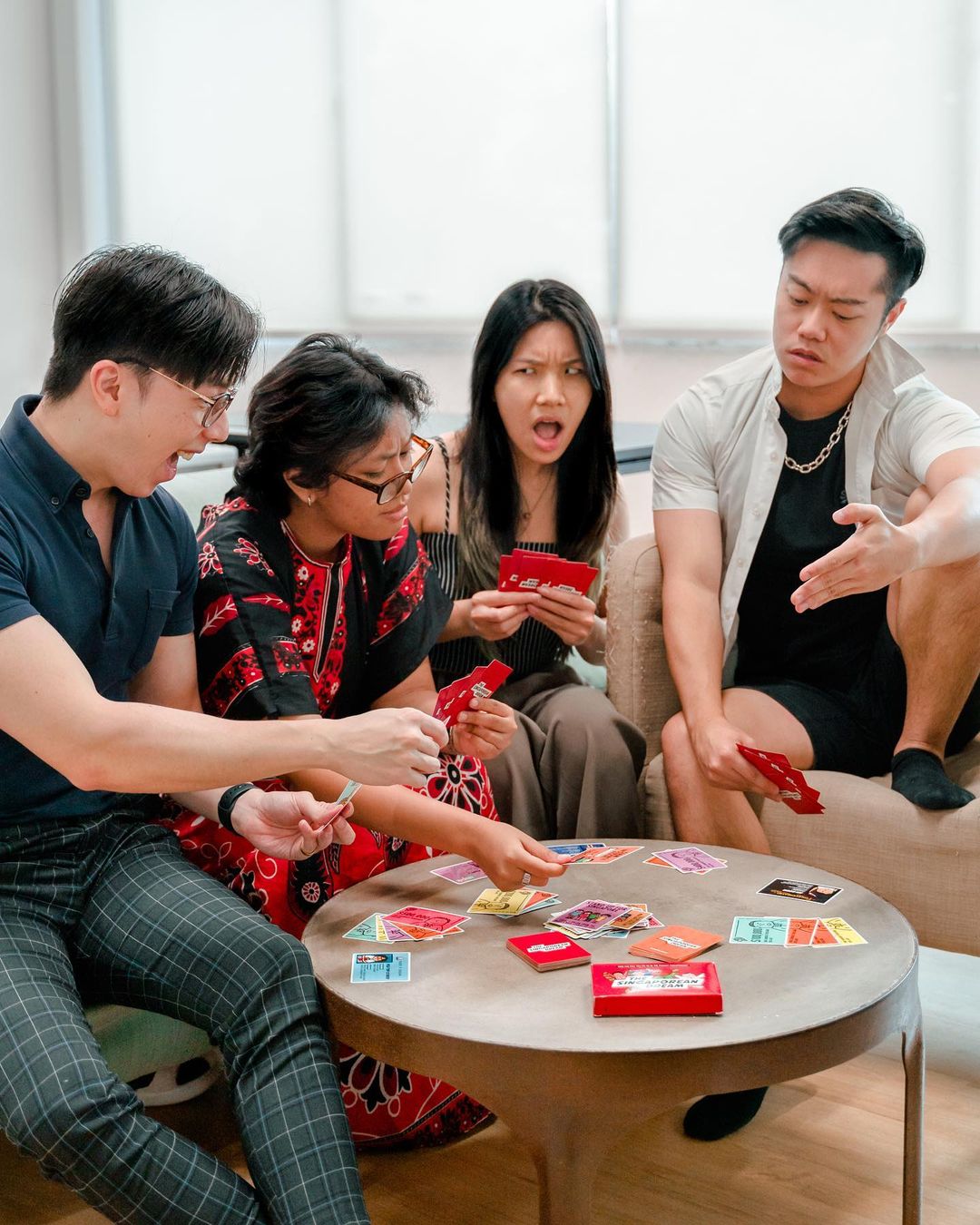Slang words used by Filipinos on the internet
Filipinos have long been using slang words such as bagets (kids) and takits (see you) being popular since the 1980s. But even slang words slowly get un-cool through time. Today, saying bagets is a sign of a coming-of-age – it means you’re becoming a tito or tita.
Although we can’t stop growing older, we can certainly keep up with new Filipino slang. To keep you up to date, here’s a list of Filipino internet slang words often used on social media.
Table of Contents
- Slang words used by Filipinos on the internet
- 1. OMCM – a slang word based on another slang word used to tell people they’re correct
- 2. “____, Tito Boy.” – used when saying your true feelings
- 3. Marecakes – a newer version of mars
- 4. Lods – a friend or someone you look up to
- 5. Ssob – “boss” in reverse
- 6. Awit – used to express hurt or empathy
- 7. Gege – can be used to express agreement or dismissiveness
- 8. Naur – a Filipino internet slang word that’s a play on an Australian accent
- 9. Dasurb – a way to say something is well-deserved
- 10. Dogshow – implies making a joke out of someone/something
- 11. “Forda ___ ang ferson.” – Filipinized English words popularized on TikTok
- 12. Pi – a Gen Z slang for a Filipino honorific
- 13. Yarn – a unique, fun way to say “that”
- 14. Inch – a confusing slang commonly seen in buy-and-sell accounts
- 15. “Tama ka na ante.” – use when someone is going overboard on the internet
- 16. “Mama mo” – Filipino version of the classic “mom insult”
- Keeping up with Filipino internet slang words
1. OMCM – a slang word based on another slang word used to tell people they’re correct

Image credit: @thesmartlocalsg/@pichancruz via Instagram
Starting with an evolved, internet version of an existing slang word, “OMCM” is pronounced as “omsim”, a slang for the Filipino word “mismo” which means “that is correct.”
It’s still used to tell people that they are right but it’s also a way to express your agreement with something someone else said. Imagine standing behind your friend who just expressed their opinion – but on the internet.
For instance, a tweet like “SB19 is such a talented bunch” warrants a response of “OMCM”.
2. “____, Tito Boy.” – used when saying your true feelings

Actress Sue Ramirez on Tonight with Boy Abunda
Image credit: @RegalFilms via Twitter
“____, Tito Boy” is a reference to talk show host Boy Abunda, known for being a listening ear to Filipino celebrities. This is often heard from teary-eyed celebrities addressing an issue about themselves on his talk shows.
On social media, we use this when expressing our honest feelings. For example, if a celebrity crush tweeted a photo we found cute, we would quote retweet it and say, “Aasawahin, Tito Boy.” (“I want to marry him/her/them, Tito Boy.”)
When we use the Tito Boy statement, we often imagine ourselves dabbing away our tears, our voice cracking as we speak, to mimic the celebrities on Abunda’s talk shows.
3. Marecakes – a newer version of mars

Image credit: @thesmartlocalsg/@a.quan.man via Instagram
“Marecakes” is used typically by the girls and their gay BFFs to call female and feminine friends.
It’s a quirky, new slang term used to refer to female or gay friends on private chats and in social media instead of the Filipino words “mare” or “kumare”. Meanwhile, the older slang “mars” is more openly used in real-life conversations.
The suffix “-cakes” is added to make nouns used to refer to friends sound more endearing. Aside from “marecakes”, there are also “beshiecakes” and “lodicakes”.
Recently, Filipino K-pop fans began making their idols say slang words like these on video call fan meetings. In fact, a Filipino Reveluv has successfully taught the word “marecakes” to Red Velvet’s Wendy and invited her to be their “marecakes” in a video call.
4. Lods – a friend or someone you look up to

Image credit: @thesmartlocalsg/@lemon.visuals via Instagram
The Filipino internet slang word “lods” came from the slang “lodi” which is simply “idol” in reverse.
While it can be used to refer to someone you look up to, it can also be used to refer to a friend. It can even be used teasingly to address a friend who’s doing well in life.
For instance, you can say “Grabe ‘yun, lods” when someone you know does or says something wild, whether positive or negative, or achieved something great. When a friend receives a huge pay raise, for example, you can reply with “Grabe ‘yun, lods.”
As Filipinos like to have some variation in our internet slang words, “lodicakes” is also used.
5. Ssob – “boss” in reverse

Image credit: @thesmartlocalsg/@doreenfly via Instagram
By now, you might be able to tell that we Filipinos love our pet names. Besides “makecakes” and “lods”, another one you should be familiar with is “ssob” which is just the English word “boss” in reverse.
You’ll see this used often in Filipino fandom spaces – particularly P-pop and e-sports – to refer to celebrities or fellow fans they respect.
Some people also use this as a term of endearment for their friends, partner, or family members.
6. Awit – used to express hurt or empathy

Image credit: @thesmartlocalsg/@iamhuiwen via Instagram
The Filipino word “awit” literally means “song” in English. But, on social media, it’s short for “aw, ang sakit” (“ouch, it hurts”) and is used when you feel hurt or when you feel bad about something.
For example, the sentence “Awit, lods” loosely translates to “That’s too bad, man”.
Since it translates to “too bad”, it can also be used to express sympathy during small mishaps, but be sure not to say this in relation to serious situations such as accidents and deaths.
Some people also say “Songs, bro” instead of “Awit, lods” to play around with the slang term.
7. Gege – can be used to express agreement or dismissiveness

Image credit: @thesmartlocalsg via Instagram
“Gege” comes from the Filipino word “sige” or “okay” which is often shortened into just “‘ge”.
It’s usually said when you’re agreeing with someone – whether wholeheartedly or reluctantly -, accepting your defeat, or when you’re replying dismissively to someone.
You can repeat “ge” as many times as you like – from “gege” to “gegege” to “gegegege” – but there is no rule as to which version means a positive or a dismissive “okay”. Whether someone is agreeing with you or dismissively replying to you still depends on the context of the conversation.
8. Naur – a Filipino internet slang word that’s a play on an Australian accent

Image credit: @thesmartlocalsg/@saltandpeps via Instagram
Contrary to what many Filipinos think, the slang word “naur” isn’t an upgraded version of “naol”, a shorter term for “sana all” which is used to convey envy.
“Naur” is simply “no” written and read in an Australian accent. It’s used to say “no” or to react to something ridiculous.
For instance, when someone says something you don’t agree with, you can respond to them with “naur”. This Filipino internet slang word can also be typed as “nauurrr” for emphasis.
In relation to “naur”, some people may also refer to the Aussie accent as an “OZ accent”.
9. Dasurb – a way to say something is well-deserved

Image credit: @thesmartlocalsg/@lemon.visuals via Instagram
The Filipino internet slang word “dasurb” came from the English word “deserve”. It is used to say that something that happened to someone is well-deserved.
When used positively, this means that you’re happy for someone. Used negatively, it means you’re glad that karma got that person.
Since Filipinos love to be creative with our speech and have options, this simple slang word can also be spelled as “dasarb” or “dasurv”.
10. Dogshow – implies making a joke out of someone/something

Image credit: @thesmartlocalsg/@emilyncyt via Instagram
In everyday language, “dogshow” in a Filipino context translates to “pagtripan” which means “making fun of someone” or “making a joke out of a situation”.
Typically, the slang word is used during light situations, when someone just does something amusing. For instance, when you say “Dinogshow ni Josh si Justin doon sa live”, you’re laughing at what Josh did to Justin.
However, it’s important to take note of the context when using or interpreting this Filipino internet slang. In a negative context, “dogshow” can also be used to say that someone took something lightly when they shouldn’t.
11. “Forda ___ ang ferson.” – Filipinized English words popularized on TikTok

Image credit: @thesmartlocalsg/@emilyncyt via Instagram
“Forda” and “ferson” are probably some of the easiest Filipino internet slang words to understand. “Forda” is simply the English phrase “for the” while “ferson” is just the word “person” misspelled.
However, when used together, the phrase implies that someone is doing all they can to do a certain thing. For instance, “Forda explain ang ferson” means “Someone is doing their best to explain something”. “Ferson” can refer to yourself or someone else.
“Forda ___ ang ferson” can also be used to explain how someone is doing. When you say “forda pagod ang ferson“, it means “I’m/You’re/He’s/She’s tired”.
This Filipino slang was recently popularized on TikTok.
12. Pi – a Gen Z slang for a Filipino honorific

Image credit: @thesmartlocalsg/@fields_ofsunflowers via Instagram
The “pi” at the end of tweets or texts by Gen Z Filipinos is likely not the mathematical pi.
It’s actually the Filipino honorific “po” deliberately misspelled to sound cute. Just like “po“, you can put “pi” in the middle or end of any sentence.
A popular way to use this Filipino internet slang is by saying “thanks pi.”
13. Yarn – a unique, fun way to say “that”

Image credit: Margarida Afonso via Unsplash
A lot of young Filipinos find it hard to keep a straight face when they see the English word “yarn” nowadays, all thanks to the Filipino slang “yarn.” It’s a playful way of saying the Filipino word “yan,” which translates to “that.”
The common way to use the slang word is to put it before an adjective and form a question. For example, when someone is well-dressed, you might say, “Ganda yarn?”
You can also use it casually to replace the word “yan” in sentences, adding a humorous flair.
14. Inch – a confusing slang commonly seen in buy-and-sell accounts

Image credit: @thesmartlocalsg
The Filipino internet slang “inch,” commonly used in BNS or buy-and-sell accounts, has sparked many debates regarding its true meaning.
Some use it as a portmanteau for interest check, which means the seller is ensuring there are interested buyers before listing a product for sale.
But then, others think it means “interested.” So, when sellers throw in an “inch” in their post, people also reply with “inch” to express that they’re interested.
As both meanings are popular, it’s safe to say “inch” can mean both “interest check” and “interested”.
15. “Tama ka na ante.” – use when someone is going overboard on the internet

Image adapted from: @thesmartlocalsg via Instagram
When someone is being too much on the internet, you can say “Tama ka na ante“. “Tama ka na” translates to “stop,” while “ante” is derived from “auntie” and is recently used on the internet to say “girl” or “teh” in Filipino.
Another variation of this slang is “Ama ka na accla“. Here, “Ama ka na” is slang for “tama ka na,” and “accla” is slang for “bakla,” which means “gay,” although it’s not exclusively for referring to gay individuals.
For an even more creative and advanced version of this slang, simply say “Amaccana“.
16. “Mama mo” – Filipino version of the classic “mom insult”
https://www.instagram.com/p/C0_Ka3PL6Og/
Video credit: @netflixph via Instagram
“Mama mo” is by no means new, but it can be confusing for people who aren’t used to “kanal” (street) humor or slangs in general. It recently stepped into the spotlight, thanks to Anthony Jennings’ character, Snoop, in the hit teleserye Can’t Buy Me Love.
If you receive “mama mo” as a reply, don’t read too much into it. It’s just the classic “your mother” joke which doesn’t really mean anything but is a fun clapback.
Keeping up with Filipino internet slang words
These are only some of the Filipino internet slang words young Filipinos use on social media today. There are a multitude of others, with new ones being coined every so often.
If you find yourself confused with all these terms, a pro-tip is to try pronouncing the words slowly or spelling them backwards to figure out their origin. Don’t be confused when you see the slang words you know spelled differently, too, as we just like switching things up.
To be sure about what an internet slang word means, you can ask any young Filipino who likes to spend time on social media. There’s a high chance the word you want to know about is part of their daily internet vocabulary.
If you’d like to learn the every day Filipino language, learn these basic Filipino phrases. Then, expand your vocabulary to street speak with these Tagalog slang words.
Cover image adapted from The Smart Local Singapore.
Originally published on 9 November 2021 by Kim Shelly Tan. Last updated on 5 January 2024 by Kim Shelly Tan.
